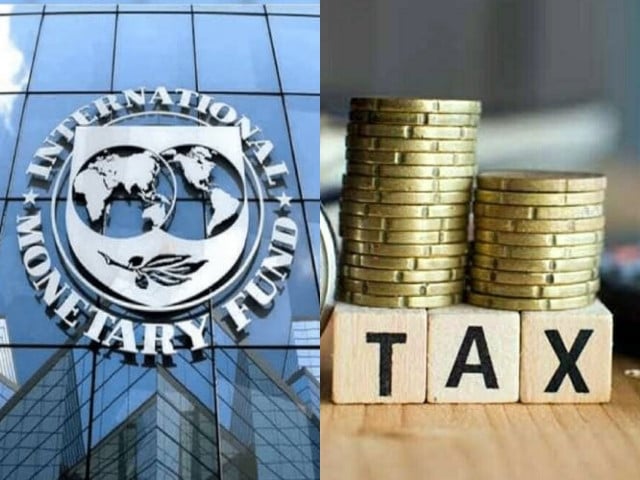-

-
-
Loading

Loading


The International Monetary Fund (IMF) has asked Pakistan to tax civilian and military pensioners and withdraw income tax exemptions from various pension schemes, as the Fund’s mission quietly lands in Islamabad to begin negotiations for two bailout packages. The global lender’s demand to tax pensions is part of a host of recommendations it has put forth for inclusion in the upcoming budget. The IMF has asked Pakistan to recover additional taxes equal to 0.5% of the Gross Domestic Product (GDP) or around Rs600 billion from salaried and business individuals. If the government accepts the IMF’s demand to tax retiring and retired individuals, it will receive additional income tax ranging from Rs22 billion to Rs25 billion per annum after withdrawing all tax exemptions, including those on various pension funds. Sources reveal that an IMF team arrived on Thursday for negotiations on one to two bailout packages. The team will engage with Pakistani authorities starting today (Friday), with the remaining members, including Mission Chief Nathan Porter, expected to arrive next week. Finance Minister Muhammad Aurangzeb stated two days ago that IMF talks for the long and large programme would begin within seven to 10 days. However, negotiations have commenced within 72 hours of his public statement. The finance minister did not respond to inquiries about whether the IMF accelerated the review talks following his public statement. Pakistan is seeking two separate loan programmes; the Extended Fund Facility (EFF) for structural reforms and the Resilience and Sustainability Facility (RSF) to address climate change-related challenges. This marks the 24th bailout package, indicating that both the IMF and successive Pakistani governments have failed to achieve the objectives of previous bailout packages. The finance minister mentioned two days ago that the size and duration of the IMF programme were not yet finalised, and it would take some time to finalise the RSF facility. A finance ministry official suggested that talks might be held for both facilities simultaneously. IMF Resident Representative Esther Perez did not respond to a request for comments. Pakistan’s annual financing requirements remain in the range of $25 billion to $30 billion, placing a heavy burden on the government. Government sources indicate that the 24th programme is expected to be one of the toughest Pakistan has ever signed. They said the IMF will heavily focus on enhancing the Federal Board of Revenue’s (FBR) revenues, with new taxes amounting to Rs1.3 trillion proposed, with half aimed at salaried individuals. The sources said that the IMF has recommended that Pakistan eliminate income tax exemptions enjoyed by pensioners and tax their pensions and gratuity starting from the new fiscal year, commencing in July. Additionally, the IMF proposes ending income tax credits for voluntary payments to workers’ participation funds. These measures may adversely affect Pakistan’s already marginalised fixed-income population, which has been grappling with double-digit inflation for an extended period. Despite the erosion of their purchasing power, salaried individuals and pensioners have little influence. Salaried individuals have seen a steady rise in their tax burden over the years despite a fast erosion of purchasing power. The IMF has also advised Pakistan to review the income tax and pension regimes of sole proprietors who benefit from social security and pension contributions. In the last budget, the government increased the burden on pensioners by taxing contributions to private-funded gratuity and pension schemes. Sources estimate the annual cost of income tax exemptions for retired government servants and military personnel to be over Rs12 billion. The tax exemption on pension commutation received from the government or under any pension scheme could also be withdrawn, generating an estimated revenue of close to Rs4 billion. Similarly, if the recommendation is accepted, the gratuity or pension commutation by an employee upon retirement or by their heirs in case of death will also be taxed, generating an estimated annual revenue of Rs900 million based on last fiscal year’s figures. The tax credit for contributions to approved Pension Funds might also be withdrawn, generating approximately Rs2 billion in annual revenues. Additionally, any pension received by a Pakistani citizen from a former employer is proposed to be taxed, generating another Rs2 billion. Voluntary participants in pension funds, pensioners receiving monthly instalments from an income payment plan, and pensioners withdrawing any amount from their approved pension funds are also proposed to be taxed. Similarly, any income from a Pension Fund approved by the Securities and Exchange Commission of Pakistan (SECP) is proposed to be taxed. If accepted, the pension funds of Punjab, Sindh, and Khyber-Pakhtunkhwa may also be subject to income tax, potentially yielding Rs6 billion to Rs8 billion per annum. Sources suggest that pensioners who have invested in the Behbood Savings Certificate and Benefit Account and Shuhadas Family Welfare Account might also come under scrutiny. Published in The Express Tribune, May 10th, 2024. Like Business on Facebook, follow @TribuneBiz on Twitter to stay informed and join in the conversation.
if you want to get more information about this news then click on below link
More Detail